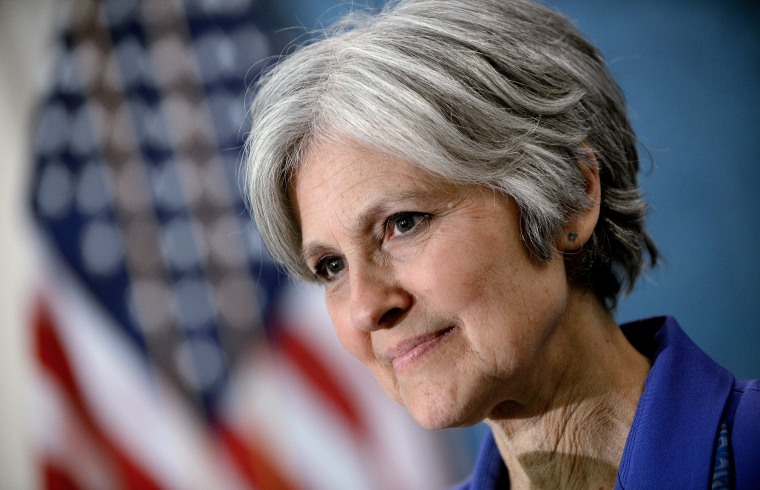With Donald Trump on one side, and Jill Stein on the other, Hillary Clinton may have hit the opponent jackpot.
Vermont Sen. Bernie Sanders ran in the primaries as a self-described Democratic socialist by anchoring his radical message in bedrock American values and using language that rendered himself safe for consumption by a wide swath of the electorate.
And it worked well. Sanders won 23 states in his race against the now-Democratic nominee and he’s the second most popular political figure in the county, according to a recent NBC News/Wall Street Journal poll, just behind Michelle Obama. (Clinton came in 12th.)
With polls showing at least some interest in third-party candidates this year, Stein, the Green Party’s nominee for president, seems unsure how to speak to anyone this side of Noam Chomsky. Her strategy is heavily dependent on winning over Sanders supporters, and Sanders' playbook is right there for the taking. So far, she's misread it.
That was clear during a hour and half town hall on CNN Wednesday night with Stein and her vice presidential nominee Ajamu Baraka, which was likely the biggest platform the two-time presidential candidate has ever gotten (her campaign sent seven emails promoting it).
Where Sanders was uplifting, with his “America” ad and a slogan that promised “A Future to Believe in,” Stein said, “We don't really have a future right now to offer our younger generation.”
Where Sanders tempered his disappointment with President Obama to avoid needlessly alienating people who feel warmly about the country’s first black president, Baraka defended calling Obama “your uncle tom president” in a blog post.
Baraka said he used the slur that describes a black person too eager to please whites in order "to shock people” into thinking more critically about Obama. “I stand by that, even though it sounds very inflammatory, and provocative, and probably very strange to this massive audience here tonight,” he told CNN host Chris Cuomo.
Where Sanders won cheers for saying he was sick of hearing about Clinton’s emails, Stein said, “with Hillary's abuse of the rules, she was sort of too big to jail.”
Where Sanders always promised to fight Trump, even while not cooperating with Clinton, Stein said, “I will have trouble sleeping at night if Donald Trump is elected. I will also have trouble sleeping at night if Hillary Clinton is elected.”
Where Sanders long ago cut loose some of the left's divisive wedge issues that distracted from his core message, Stein repeated her call to boycott Israel and end its special relationship with the U.S.
Where Sanders acknowledged voters’ concerns with terrorism and vowed to combat ISIS on his own terms, Stein said, “ISIS is not about to launch a major attack against our country” and blamed U.S. foreign policy for the rise of Islamist terrorism.
“If we started it, we and our allies have the capacity to shut it down,” she said, proposing “a new kind of offensive -- a peace offensive in the Middle East.”
Most perplexing, Stein and Baraka said little about economic inequality and campaign finance, the two pillars of Sanders’ message. In a 90-minute town hall, she also did not make more than passing references to financial reform, labor rights, LGBT rights, abortion rights, health care, or immigration reform.
Stein and Baraka spent more time talking about the environment and racial justice issues. But they seemed most interested in American foreign policy, suggesting they would close most or all of the U.S. military bases abroad, which may help explain why Russian media outlet RT has taken an interest in her candidacy.
When Stein attacked conservative casino mogul Sheldon Adelson, a frequent liberal bugaboo, she did so for his involvement in Israeli elections, not American ones, where he was by far the single largest donor in the 2012 campaign.
Asked about her path to victory, Stein pointed to the 43 million Americans with student debt, since she wants to cancel all student loans. “That is a winning plurality of the vote,” she said. Barely. In 2012, 126 million Americans voted. If split evenly between three candidates, Stein would need just over 42 million votes to win.
Stein is a medical doctor, not a politician, and she doesn’t have the army of image makers and media coaches available to major party nominee, so having imperfect talking points is forgivable.
But Sanders proved there is wider audience for a left-wing message, Stein is simply preaching to the choir.
A stronger third-party challenge on Clinton's left could make the Democratic nominee at least more concerned about her left flank, given the possibly that it could cost her the election, as Ralph Nader did to Al Gore in 2000.
But given her rhetoric and performance Wednesday night, it’s understandable why Clinton officials feel comfortable ignoring Stein.

